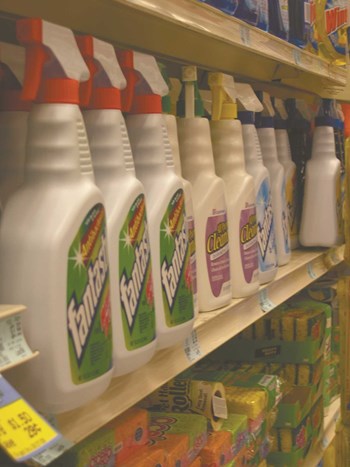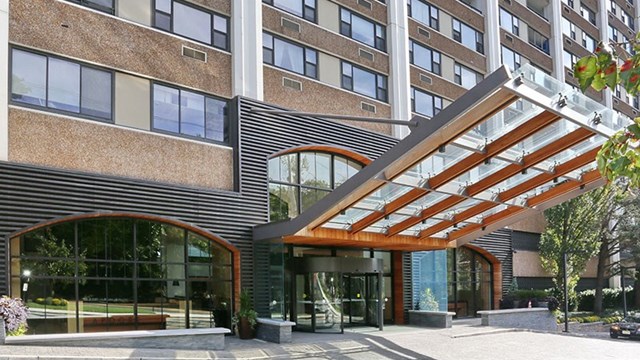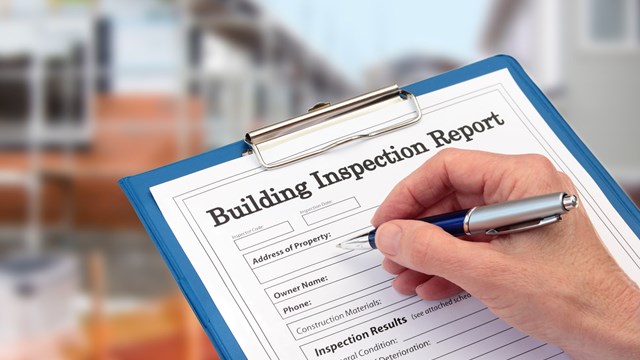
Along with big-ticket items like boilers, HVAC systems, and the like, residential buildings also have to purchase lots of little, everyday things like cleaning supplies, light bulbs, and paper products. Though not necessarily expensive in and of themselves, costs for these small things can definitely add up over the course of a year. It’s up to managers and building staff members to keep a lid on costs and be conscientious about limiting waste.
Operations and Use
Every time the lights are turned on, dust settles on a surface, or somebody tracks some mud into the hallway, supplies are needed. The day-to-day operations of a building will consume products that need to be replaced on an ongoing basis, says Jerry Blumberg of Kew Forest Maintenance Supply in Forest Hills. “On a daily basis, the list of things that are used include: cleaning supplies, carpet cleaning equipment, plumbing supplies, light bulbs, replacement parts…those are your dailies.” Other items, such as filters and trashcans will need to be replaced less often, but still on a regular basis. In addition, seasonal items such as salt, shovels, sand and other season-specific supplies should be considered in the overall picture of necessary purchases in the yearly budget.
Especially when considering a larger building, the daily use can add up quickly, says Alan Crawford, owner of Crawford Community Management Services, LLC in Rumson. “In a setting where we have a big building, we probably go through two gallons of cleaner a day.”
All of these products are purchased out of the maintenance budget, and over the course of a year, the total can add up, especially in larger buildings with more traffic. “Cleaning supplies and products make up the majority of the supplies budget,” says Ira Meister of Matthew Adam Properties, Inc. in Manhattan, “although it’ s generally not a large part of the overall budget, except when there is a major repair being done. In that case, especially if the building is doing the repair itself, there will likely be more money spent on these supplies.”
Along with the regular sweeping, mopping, window cleaning, and carpet cleaning, these repairs can generate a great deal of extra dust and other waste. Moreover, repairs that may take several days, weeks, or even months will have a substantial effect on the quantity of cleaning supplies that are consumed. “Every building may have some unexpected repairs, so they buy extra supplies,” says Syed Haque, a Rego Park, Queens-based accountant specializing in co-ops and condominiums. “Some of the buildings do their own repairs, so that’s when they need some extra supplies.”
Although the types of supplies that are needed and used seasonally may differ, the overall costs throughout the year may not vary as much as might be expected. “I don’t think that you can generalize when buildings spend more money on supplies,” says Haque. “It varies from building to building and in different situations. It all varies from month to month.” Wintertime typically sees an increase in snow removal supplies such as salt and shovels, while in the summertime, there is more of a need for supplies related to outdoor activities.
Ordering and Inventory
One benefit to the community living of co-ops and condos is the maintenance and upkeep of the community areas, which includes the ordering of these supplies. Keeping necessaties on hand without overstocking is largely up to those who are running the building, alleviating the responsibility from the residents, except in their individual units. Still, there are generally tiers of responsibility to make sure that things are running smoothly, says Meister. “The superintendent orders the supplies and the managing agent oversees the process.”
In smaller buildings, and ones with resident do-it-yourselfers, the shareholders might have a more hands-on approach, says Blumberg. In those cases, “it’s the building manager’s responsibility to order and also the tenants’ depending on how big the building is.”
Keeping up with supply levels is another important aspect to managing the property. Running out of salt after a snowstorm can result in falls, fines, and lawsuits, and having no place to store excesses can make an awkward journey into the building or a cramped storage area. To avoid these problems regular inventory should take place. “Inventory should happen on a monthly basis, at least,” says Blumberg.
Most buildings keep closer watch on supply levels, however. “Inventory should be rolling,” says Meister. “There should be a constant eye out for supplies that run low. Conversely, if there is an excess of supplies on hand, that becomes an issue for storage. This isn’t Alaska, or someplace where the truck may only come every couple of months, so keeping too much inventory doesn’t really make sense.”
Asking for Bids
In the event of high-dollar operations in a building, such as a renovation or new installation, bids are commonplace and expected. It may not seem like a likely practice, but bids may also be appropriate for large orders of supplies, and can be one way of keeping costs down, says Meister. “Buildings will solicit bids if they are ordering a large amount, and again, if there is a special need, such as a major repair.”
“For regular supplies they don’t ask for bids,” agrees Haque, “but if they’re doing some sort of major repair, then they do ask for a bid. In terms of cleaning supplies, however, they won’t ask for a bid, they will just order the supplies.”
In times gone by, when brand loyalty was considered good business, supplies would be ordered from the same location or company year after year. Times are changing, though, and comparison-shopping is more and more commonplace.
“Unfortunately today the loyalty is not there, due to the pricing crisis,” says Blumberg. “They will shop around for a quote for supplies. Absolutely.” It can really pay to do some homework on the costs of products and how to maximize the needs versus dollars ratio, saving the building a great deal of money in the long run.”
Loyalty isn’t the only factor that entices those who order to stay with one supplier, says Crawford. “When we first take over a building, we find out who’s supplying the products. Then, once you do a cost analysis, you just start using that one supplier.
There are a couple of good reasons why sticking with one supplier can be good business, says Crawford. “One: you’ve already done the cost analysis research on whether or not they are providing you with the best price. Two: when you need something in a hurry, you’ll just ask the supplier and they’ll send it right away because of your relationship with them. When you don’t have a relationship with a supplier, it’s more difficult to get someone to jump on your order when you need it.”
Waste and Theft
Another way to keep costs to a minimum is to monitor how supplies are used and when they go missing. “Theft is not usually a big problem,” says Meister. “Occasionally a bottle of Windex will go missing, but it doesn’t usually become a major issue. Keeping things under lock and key can help.”
On the issue of materials coming up missing or misused, Blumberg agrees: “I would say waste, I wouldn’t say theft. It’s not really a problem at all.”
And even waste isn’t a big problem, in general, says Crawford. “The only thing that could be wasted, and it usually isn’t as long as it’s stored properly, is the ice melt. You can never forecast what kind of weather you’ll have. That’s the only variable in ordering supplies. General cleaning, paper towels, toilet tissue, and any of those sort of supplies are things that are generally not wasted.”
Going Green
With the green movement and energy initiatives in full swing and still gaining momentum, buildings have been cited as one of the top two contributors to our carbon emissions problem. Many homeowners, residents, supers, and managing agents have started converting their practices and products to more environmentally sensitive options, but these options are not always money-saving at the outset.
“Today, a lot of co-ops and condos are going into green products, green equipment, and green supplies, and yes, they are typically more expensive,” says Blumberg.
Sometimes the costs are made up in the long term, such as compact fluorescent light bulbs that are advertised to run for nearly a lifetime, while others are on the market with the simple benefit of helping to make our presence in the world more sustainable.
Customer Training
Some companies even offer training to customers about how to keep costs down, says Blumberg, and Kew Forest Maintenance Supply is one such company. “When we go in, and we sell cleaning supplies, we do a complete training program either on-site or in classrooms. We also train them on how to properly use the equipment and the supplies. And if they know how to properly use the equipment, they will save money.”
This training is accessible, too, not just once a year in a remote location…and not offered by only one company. “We train them on-site or in our own classrooms,” says Blumberg, “ and it’s offered anytime. There are a few of us (companies) who do it. I would say that it’s fairly unique, but not exclusive.”
Cost Controls
With a wide variety in sizes of buildings and responsibilities of supers, managers, and tenants, making blanket recommendations designed to cut costs may be difficult, says Crawford.
“The best thing that you can do is to make sure that the products that are being ordered are the products that are being used. That’s the first thing. Second thing, is doing that first initial cost analysis and making sure that you’re working with the vendor that is going to provide you with the best price, and give you the supplies in a timely manner. If you wind your supplies down, you’ll rush out to the closest store and buy the supplies there, which of course isn’t the best price. So if you’re working with someone (a supplier) and they know that you are ordering certain things at certain times, they will also remind you ‘is everything okay? You should be ordering some more cleaner. Is there a particular reason that you aren’t ordering cleaner at this time?’”
Another key element, says Crawford, is “having a staff that has longevity that you can trust.”
Denton Tarver is a freelance writer and a frequent contributor toThe New Jersey Cooperator.






Leave a Comment